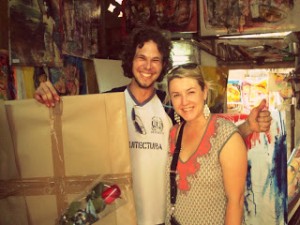
Cuba behind the curtain
“To travel is to discover that everyone is wrong about other countries.” – Aldous Huxley
 I checked my expectations at the door of the airport, long before I checked my baggage, when the long anticipated date of my trip to Cuba finally crept into the present moment.
I checked my expectations at the door of the airport, long before I checked my baggage, when the long anticipated date of my trip to Cuba finally crept into the present moment.
This was a different sort of feeling than I had ever felt before when aiming myself abroad.
There is a veil that exists between our two countries, and any information that makes it through this veil, whether positive or negative, has always been suspect to me. Sometimes a little information can be even worse than none at all, as in just enough to wrap a grand illusion around the truth.
In the absence of a complete picture, our greatest illusions and delusions are born.
The farther away we are from, or the more ignorant we are of, something, the more our brains pull from assumptions and projections to make sense of what we don’t see.
On our second day there, a Cuban historian asked us to describe our initial impression in two words. I replied, “beautiful mystery.”
In many ways it still is a beautiful mystery, but then so is the rest of the world.
Spending time in Cuba in the context of a ‘people to people’ educational tour provided an invaluable opportunity to peel back a few layers of this mystery, however, and to shed some of the collective assumptions held here in the States.
It may come as a surprise to some that Cubans by and large do not seem to regard Fidel Castro, or his brother Raul, as tyrannical villains — in fact they seem to enjoy a large base of relative support, which often times can at least border on genuine love.
When you add Che Guevara into the equation, the scale probably tips even more toward love.
His face is tattooed on bodies, hung on walls and printed on just about every type of surface one could conceive. They are revolutionary heroes to many, still to this day.
Presently, Cuba seems nowhere near as divided as the United States politically, and even many of the critical voices don’t seem to be ready to throw away their current model of governance completely.
Which leads us to the embargo
What does this have to do with the embargo? Much of the rhetoric used to perpetuate and explain the policies surrounding the embargo wrap themselves in some lofty idea that we are supporting the ‘freedom’ of the Cuban people.
Meanwhile, the embargo itself seems to be one of the biggest obstacles to true freedom for the Cuban people, as it prevents them from participating as global citizens in the global economy as they see fit.
The embargo means that even with one of the best healthcare systems in the world, certain medical equipment and medicines are not available to people who need them. It means that their basic human right to health is being denied via U.S. policy.
It is not the government nor the Castros that are truly being punished by the embargo — it is the people.
Yet contrary to a popular yet perhaps misguided opinion, there is not as deep a chasm of disconnect between these two entities (the government and the people) as many might think.
Cubans have a different type of democracy than we do, more participatory than representative, but they do not necessarily suffer from a lack of it — maybe no more and no less than we do.
Perhaps we should focus on pulling the last remnants of our own democratic system from the plutocratic vacuum into which it is disappearing and let the Cubans figure their approach out for themselves.
Would that not be the true freedom?
What it comes down to for me is that the embargo makes the United States look like a coward, a scared bully that is threatened by those who think or act differently.
If we truly believe that the Cuban communist/socialist model is so destined to fail then why do we not just give it the chance to run its course and prove its faults to the rest of the world?
By holding them back from whatever destiny is truly their own, we come away looking as if we are scared that they might actually thrive and thereby discount countless years and stories of opined propaganda that says otherwise.
If it is freedom that we believe in then our next move is obvious — the embargo must end.
For more than 20 years, the rest of the world has cast their vote in this direction. The last vote of the U.N. was an overwhelming 188 to 3 in favor of ending this oppressive policy.
If we want to maintain any sense of legitimacy on the international stage, it is now our move.
— Courtney Parker is a second year graduate student from Gainesville

